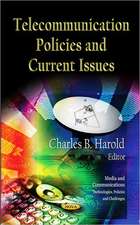Network: Theorizing Knowledge Work in Telecommunications
Autor Clay Spinuzzi PhDen Limba Engleză Paperback – 16 dec 2015
| Toate formatele și edițiile | Preț | Express |
|---|---|---|
| Paperback (1) | 282.48 lei 6-8 săpt. | |
| Cambridge University Press – 16 dec 2015 | 282.48 lei 6-8 săpt. | |
| Hardback (1) | 462.74 lei 6-8 săpt. | |
| Cambridge University Press – 28 sep 2008 | 462.74 lei 6-8 săpt. |
Preț: 282.48 lei
Nou
Puncte Express: 424
Preț estimativ în valută:
54.05€ • 56.58$ • 44.99£
54.05€ • 56.58$ • 44.99£
Carte tipărită la comandă
Livrare economică 31 martie-14 aprilie
Preluare comenzi: 021 569.72.76
Specificații
ISBN-13: 9781107564862
ISBN-10: 1107564867
Pagini: 242
Dimensiuni: 151 x 228 x 15 mm
Greutate: 0.33 kg
Editura: Cambridge University Press
Colecția Cambridge University Press
Locul publicării:New York, United States
ISBN-10: 1107564867
Pagini: 242
Dimensiuni: 151 x 228 x 15 mm
Greutate: 0.33 kg
Editura: Cambridge University Press
Colecția Cambridge University Press
Locul publicării:New York, United States
Cuprins
1. Networks, genres, and four little disruptions; 2. What is a network?; 3. How are networks theorized?; 4. How are networks historicized?; 5. How are networks enacted?; 6. Is our network learning?
Recenzii
“And you thought theory was boring. Read this book to change your mind. Spinuzzi’s snazzy prose is part hardcore social theory, part corporate soap opera. He takes theoretical discussion of actor-network theory and activity theory in new directions, bringing them together in a productive tension to illuminate critical issues in human-computer interaction, computer-supported collaborative work, and organizational design. The empirical substrate for the theoretical work is a tour de force ethnography of a large telecommunications company. Spinuzzi talks and listens to the little people, he delves fearlessly into the complexities (and muddles) of the big theories, and is kind and generous to all. A must read.”
—Bonnie Nardi, School of Information and Computer Sciences, University of California, Irvine
“In this marvelously readable and yet theoretically challenging case study of work in a telecommunications company, Spinuzzi rethinks the (post)modern workplace—distributed, networked, spliced, improvised. He puts two of the leading explanations of such workplaces—actor-network theory and activity theory—into dialog as he follows workers and managers doing what he terms 'net work.' Through his fine-grained and always fascinating stories of their daily attempts to make sense and make do, he shows a way beyond earlier theories to a new understanding of (post)modern work and workplace learning. This is one of those rare books that is both a must-read for researchers and a good read for anyone looking for insight into how work actually gets done today.”
—David R. Russell, Professor, Rhetoric and Professional Communication, Iowa State University
"Network is a well written, very useful organizational ethnography, raising a series of significant issues about how to conceptualize organizations."
Canadian Journal of Sociology, Alex Preda, University of Edinburgh
—Bonnie Nardi, School of Information and Computer Sciences, University of California, Irvine
“In this marvelously readable and yet theoretically challenging case study of work in a telecommunications company, Spinuzzi rethinks the (post)modern workplace—distributed, networked, spliced, improvised. He puts two of the leading explanations of such workplaces—actor-network theory and activity theory—into dialog as he follows workers and managers doing what he terms 'net work.' Through his fine-grained and always fascinating stories of their daily attempts to make sense and make do, he shows a way beyond earlier theories to a new understanding of (post)modern work and workplace learning. This is one of those rare books that is both a must-read for researchers and a good read for anyone looking for insight into how work actually gets done today.”
—David R. Russell, Professor, Rhetoric and Professional Communication, Iowa State University
"Network is a well written, very useful organizational ethnography, raising a series of significant issues about how to conceptualize organizations."
Canadian Journal of Sociology, Alex Preda, University of Edinburgh
Notă biografică
Descriere
Spinuzzi examines the networks of activity that make a telecommunications company work and thrive.




